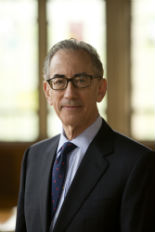Klein appointed dean of Temple's College of Science and Technology
Temple University President Neil D. Theobald has announced the appointment of Michael L. Klein as the dean of the College of Science and Technology (CST) at Temple, effective July 1, 2013. Klein, a renowned computational scientist, has served as interim dean of CST since July 2012.

"As a National Academy of Sciences member and one of the most highly cited scientists in the world, Michael Klein brings exemplary scholarship and administrative experience to the college," said President Theobald. "His leadership will enable CST to expand its research enterprise, elevate its reputation as a destination for world-class faculty and strengthen its capacity to prepare our students for careers in the global marketplace."
"Mike Klein has been highly successful in the role of interim dean. He has initiated vigorous recruiting efforts that have led to national leaders in their fields joining Temple," said Hai-Lung Dai, Temple's provost and senior vice president for academic affairs. "I am pleased that Dr. Klein has accepted the position of dean with strong support from the faculty of CST. He will continue his visionary leadership in elevating Temple as a leader in the fields of science and technology."
"I am honored to continue to build on the momentum of the college generated by Provost Dai when he was dean of CST from 2007 to 2012. Dr. Dai inspired our faculty to pursue research in exciting frontier areas, as well as creating new opportunities for undergraduates in our college," said Klein. "This is an exciting time at Temple and CST. We need to continue to develop new undergraduate opportunities in STEM fields and embrace technology more fully in the teaching mission. Going forward, CST needs to focus on research areas that underpin key themes such as energy, health, the environment and sustainability. To this end, CST will pursue interdisciplinary collaborative research initiatives in fields such as materials science, genomics and genetics and chemical biology."
Klein added that he was eager to expand CST's undergraduate research programs and raise funds for TUTeach, CST's program preparing Temple students to be the next generation of middle and high school science and math teachers.
Klein came to Temple in 2009 as director of the Institute of Computational and Molecular Science and Laura H. Carnell Professor of Science. Prior to joining Temple, he spent 22 years on the faculty at the University of Pennsylvania, where he served as director of the National Science Foundation sponsored Laboratory for Research on the Structure of Matter (LRSM) from 1993 to 2009. During this time, he rebuilt LRSM's research programs and led them to national prominence in interdisciplinary research on materials. In so doing, he pioneered new areas of materials research and fully integrated computational design into the broad range of LRSM programs.
Klein's extensive experience in materials science led to service on science advisory boards, both nationally and internationally, including Lawrence Livermore National Laboratory, the Pacific Northwest National Laboratory, the National Institute for Materials Science (Japan), the International Center for Materials Science (India) and a Max Planck Institute (Germany). He has participated in several international reviews of science research activities and national facilities.
Klein has published more than 600 original research articles with more than 46,500 citations. He is active in research that is currently funded by the NSF, the National Institute of Health and the U.S. Department of Energy. Noted for seminal contributions to the field of computer simulation and modeling that have broadly impacted both the physical and life sciences, Klein is the recipient of several major awards, including the Aneesur Rahman Computational Physics Prize of the American Physical Society (1999), the European Physical Society CECAM Prize for Computational Physical Science (2004), the Peter Debye Award in Physical Chemistry from the American Chemical Society and the Boys-Rahman Prize from Britain's Royal Society of Chemistry (2011). Klein is a member of the National Academy of Sciences, the American Academy of Arts and Sciences and the Royal Society of London. Earlier this year, he was elected honorary fellow of the University of Cambridge's Trinity College.
With more than 3,700 undergraduate students and 320 graduate students, Temple's College of Science and Technology is nationally recognized for outstanding research and innovative academic programs. With 200 funded research projects currently underway, the college will soon open the $140 million, 250,000-square-foot Science Education and Research Center, devoted solely to advanced research and science education. The college hosts six academic departments in physical, biological and mathematical sciences and features five research centers, including the Sbarro Institute for Cancer Research and Molecular Biology, the Institute for Materials Research, the Institute for Computational Molecular Science, the Center for Advanced Photonics Research and the Center for Data Analytics and Biomedical Informatics.